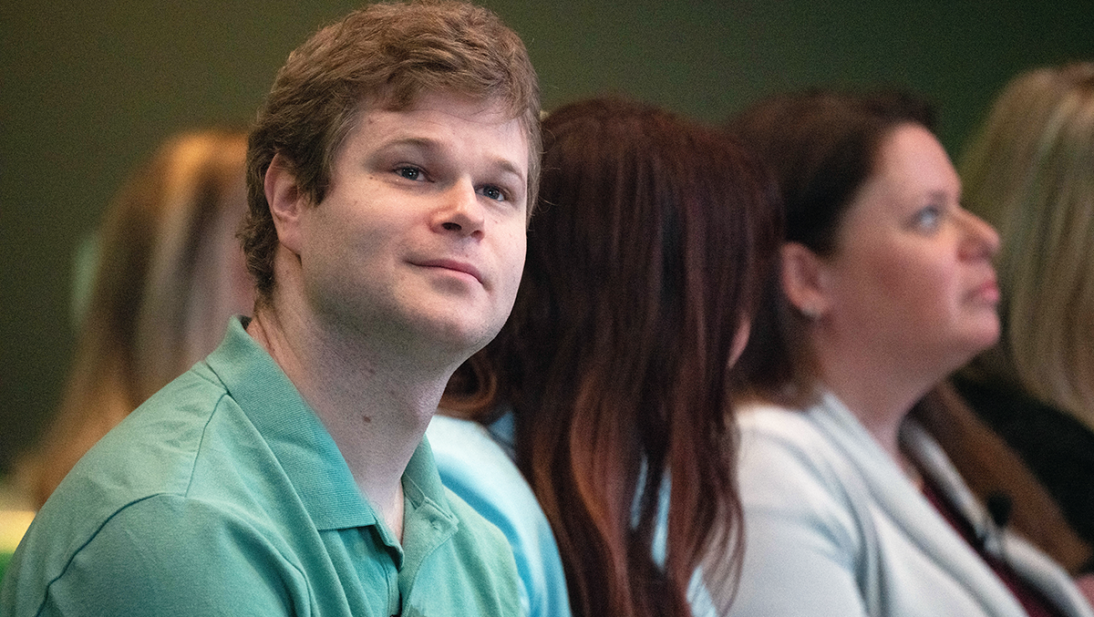It's so easy to think you know everything about the experiences of other people. But without using the power of listening, it's unlikely you will ever truly understand.
That is why Autism Awareness Month is an opportune time to take that first step and listen to the voices of those with autism and those who are connected as family members, friends, work colleagues and allies. After all, common perceptions can be misperceptions, and a willingness to listen is the first step to true understanding. Beyond that, it will take inclusion, representation and immersion to achieve the ultimate goal of full acceptance.
We invite you to begin the journey by reading about what our four colleagues across North America wish you knew about their experiences with autism.
Be more inclusive and understanding of different experiences
Case Johnson, Data Analyst, TD Bank, America's Most Convenient Bank (AMCB)
Case has worked for TD Bank for three and a half years. Contrary to some stigmas, he says that while he has autism, he’s very interested in social activities and making friends. Some autistic people may not be great at expressing themselves, but he hopes others will be patient and start a conversation even when he may not jump in right away.
“I love when people are more inclusive or understanding of differences. Everyone should have the chance to be included,” said Case. “A lot of times, especially in college, I wanted to put myself out there, but it was hard when I didn't know anyone.”
At work, Case shares that he benefits from written, as opposed to verbal, instruction. “I have a hard time processing stuff if I only hear it. If it's written, I can do better," Case said.
He likes when people take time and ask if anyone has questions or needs clarification. That is something that we all benefit from.
“Make sure everyone understands, in case they have a learning difference. Breaking a project down into steps I can do each day makes it a lot easier.”
Autonomy often works best
April Evans, Human Resources Operations Manager, TD Bank (AMCB)
April has successfully been a manager to a colleague with autism for the past few years in Mount Laurel, New Jersey. Using a collaborative approach, she has found that giving her colleague the autonomy to complete a task in a way she sees fit, but with the same goal in mind, inclusive of remaining compliant and eliminating risks, works best.
She understands that long-standing procedures are not always designed well for all people. “I define the task but allow her the opportunity to get there in a way that makes her comfortable,” said April. “I don’t want standard operating procedures to box her in. I'm aware that there are differences in thinking and execution. What matters is that we get the same end result.”
April works hard to get to know her employees individually. She wants to know what can be stressors, such as unexpected changes for her autistic colleague, and strives to avoid those situations.
She also sets up “frequent, short reviews with her employees to give them kind but direct feedback.” She has found with her experiences with autistic people that structure and routine often help them to be more productive and creates a better work environment for them to thrive.
Each person is unique in terms of what they need for support
Jonathan Robertson, Senior IT Architect, TD Bank (AMCB)
Jonathan’s youngest daughter, who is now nine years old, was diagnosed with a global developmental delay when she was two years old and received an autism diagnosis at the age of five.
In Jonathan’s experience, each autistic person is unique and benefits from different types of support. All people have evolving needs at various stages in their lives and the same is true of an individual who has been diagnosed with autism.
Jonathan’s daughter loves to interact and socialize with friends, in her own way.
“She doesn't always take well to social cues, but she wants to be around her peers, she wants to be engaged,” said Jonathan, who works for TD in Falmouth, Maine. “She is a happy, thriving second grader who is super family and friends oriented.” Getting to know each autistic person independently is key.
People have strengths in different areas
Nibedita (Nibby) Sahachakravorty, Early Talent Recruiter, TD Bank Group
Through her experience as a TD recruiter in Toronto, Nibby is flexible when she interviews new candidates. This approach has helped her get to know neurodivergent candidates better because she creates a space where her interviewee feels comfortable.
“When they have sufficient confidence, they will do their best,” said Nibby. “I want to bring them into the firm when they feel the most powerful. I want them to continue to perform at that level.”
Nibby also learned not to expect others to react the same way to a situation or have the same communication style. She does her best to stay open minded. For example, a candidate may thrive when they communicate through email but may be uncomfortable using the phone.
“People have strengths in different areas,” said Nibby. “We can’t put everyone on the same measuring board and judge them all the same way.”
Nibby does her best to acknowledge and respect each candidate so they can move forward together. She notes these methods aren't only applicable to corporations but also can help a business of any size expand their potential pool of talented candidates without having to hire specialists or a consulting firm.
